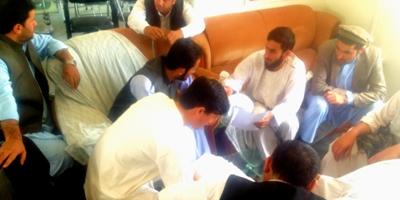
One of the most vital components of IDLO’s judicial training program in Afghanistan is well underway, with dozens of legal professionals -- 12 percent of them female – receiving intensive training in the fight against money-laundering. Attendees include judges, prosecutors, defense attorneys and Criminal Investigation Department officers.
The need is acute: in mid-2013, Afghanistan’s Central Bank said money-laundering had rocketed, with large amounts of cash leaving the country illegally. The funds are said to be hemorrhaging through loopholes in the financial system or in cash, via Kabul and Herat international airports. In 2011, through the capital’s airport alone, the Bank said $4.5 million had been laundered. A separate estimate put the total loss to the economy that year at $18 billion, or more than half of Afghanistan’s official GDP.
Public confidence is the bedrock of institutional reform. And in a country ranked last but one in the world for perceived corruption, addressing the scourge of money-laundering, embezzlement and bribery is paramount.
Even so, this is just one area in which IDLO is helping strengthen the country’s legal capacity. The full 8-week ACLEA course – the acronym stands for Advanced Continuous Legal Education for Afghanistan – includes a total of ten modules, among them Critical Thinking, Search and Seizure, Interrogation & Interview and Criminal Procedure.
ACLEA itself is part of IDLO’s wider judicial training activities in Afghanistan. Known as JTTP, the three-year transitional program, which began early this year, will ultimately cover thousands of Afghan legal professionals. Its benefits are already being felt in heightened judicial awareness in the country’s more remote provinces, as well as slowly improving access to justice for women.
For IDLO, boosting Afghanistan’s judicial system is crucial as external involvement in the country winds down. The aim is to build the rule of law from within, by empowering Afghan judges, prosecutors, defense lawyers and police investigators. Development, the organization believes, works best when it is law-based and locally owned.

